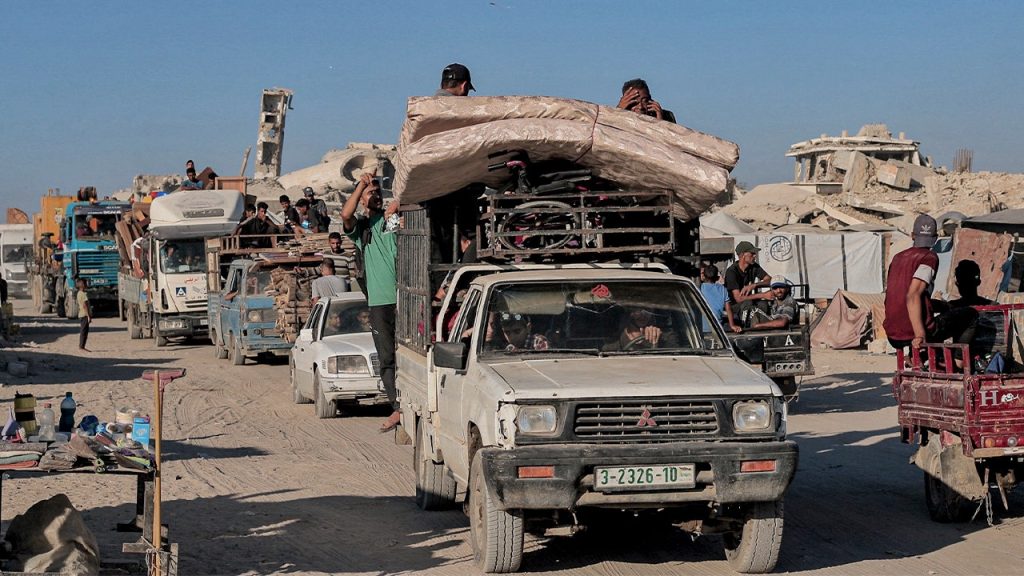Israel Escalates Military Campaign in Gaza with New Evacuation Orders
Israel has intensified its military operations in Gaza City, urging Palestinian civilians to evacuate specific areas as part of what the Israel Defense Forces (IDF) calls “Operation Gideon’s Chariots II.” Colonel Avichay Adraee, the IDF Spokesperson for Arabic Media, issued warnings to Palestinians living in targeted areas, complete with maps highlighting buildings and neighborhoods that would soon face military action. The evacuation orders cited “the presence of Hamas terrorist infrastructure” as justification for the impending strikes. Residents were instructed to “immediately evacuate the area southward to the humanitarian area in Al-Mawasi, Khan Yunis,” emphasizing the urgency of the situation as Israel expands its ground operations in northern Gaza.
In preparation for the influx of evacuees from northern Gaza, Israel has designated a humanitarian area in Khan Younis, located in the southern part of the enclave. The Coordinator of Government Activities in the Territories (COGAT), an Israeli agency, announced that thousands of tents and shelter equipment had been moved into southern Gaza ahead of the expected population movement. According to COGAT, this humanitarian zone will include “essential infrastructure such as field hospitals, water pipelines, and desalination facilities,” alongside continued supplies of food, tents, medicines, and medical equipment. The agency also stated that it was working alongside international partners to ensure adequate humanitarian supplies would be available for displaced Palestinians, suggesting an attempt to mitigate the humanitarian impact of the expanded military operations.
The decision to escalate operations in Gaza City has drawn immediate and widespread international criticism, further intensifying the scrutiny Israel has faced throughout the conflict that began in October 2023. United Kingdom Prime Minister Keir Starmer was among the first world leaders to condemn the move, stating plainly that “the Israeli government’s decision to further escalate its offensive in Gaza is wrong, and we urge it to reconsider immediately.” Starmer’s criticism went beyond mere disapproval, asserting that the escalation “will do nothing to bring an end to this conflict or to help secure the release of the hostages. It will only bring more bloodshed.” His comments reflect growing frustration among even Israel’s traditional allies over the continued military operations and their humanitarian consequences.
Canadian Prime Minister Mark Carney echoed these sentiments in equally strong terms, condemning the August announcement of expanded operations. “This escalation will do nothing to end the humanitarian horror in Gaza or the deepening suffering of both the Israeli hostages and Palestinian civilians,” Carney stated, further suggesting that such actions would only push the possibility of peace further out of reach for all parties involved. France, which has announced plans to recognize a Palestinian state at the United Nations this month, joined other European nations in a coordinated statement of opposition to Israel’s plans. The collective statement, issued on behalf of Slovenia, Denmark, France, Greece, and the United Kingdom, went so far as to claim that Israel’s planned operations violated international law and urged Israeli authorities to “reverse this decision and not to implement it.”
The evacuation orders and planned military operations in Gaza City represent a significant escalation in Israel’s approach to the conflict, occurring nearly a year after the initial outbreak of hostilities in October 2023. The timing of this escalation is particularly notable as international patience with the conflict has visibly waned, with more countries openly criticizing Israel’s military tactics and humanitarian impact. The designation of “humanitarian areas” in southern Gaza suggests an acknowledgment by Israeli authorities of the civilian impact of their operations, though critics question whether such measures are sufficient given the scale of displacement and destruction experienced throughout the territory. The relocation of thousands of civilians also raises questions about the long-term habitability of northern Gaza and what this might mean for the future geographic and demographic layout of the territory.
For Palestinian civilians caught in this latest phase of the conflict, the evacuation orders represent yet another displacement in what has become a cycle of movement and uncertainty. Many residents have already been displaced multiple times throughout the conflict, losing homes, possessions, and community connections with each forced relocation. While Israel maintains that these operations are necessary to target Hamas infrastructure and prevent future attacks, the international community increasingly questions the proportionality of the military response and its devastating impact on civilian life. As the conflict approaches its one-year mark, the expanded operations in Gaza City highlight the seemingly intractable nature of the situation, with military escalation continuing despite mounting humanitarian concerns and international calls for restraint, cease-fires, and a path toward sustainable peace.


